Organic Vs. Synthetic Fertilizer – What’s the Difference And Which is Better for Weed?
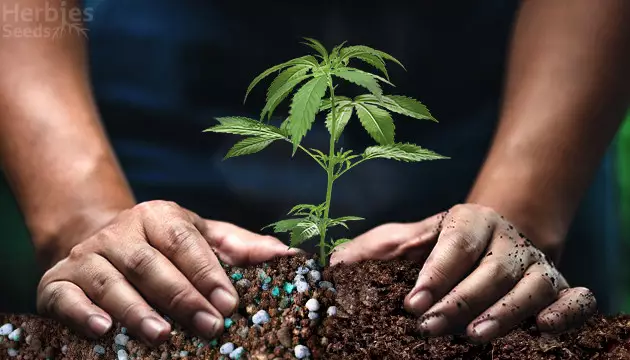
Understanding nutrients is one of the most crucial aspects of growing cannabis. However, the world of marijuana nutes is a deep pool, and you can’t just dive in without any background knowledge. We’ve outlined some of the major differences between major nutrient types in this guide to help with that.
What Are Mineral (Synthetic) Fertilizers For Cannabis?
Synthetic fertilizers are man-made mixes of minerals that plants can absorb and use instantly. The three most important of these minerals are phosphorous (P), potassium (K), and nitrogen (N). Potassium and phosphorous are both derived from minerals found naturally in the wild, while nitrogen is isolated using an industrial technique called the Haber process, which has been used for over 100 years.
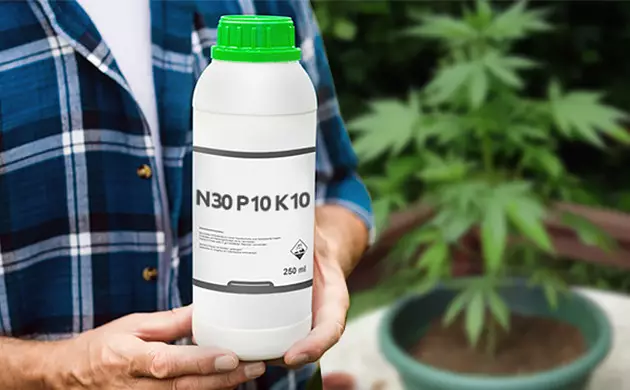
You’ll see these three minerals displayed on the front of nearly every bottle of mineral fertilizer. The numbers stated next to N-P-K represent the concentration of nitrogen, phosphorous, and potassium in the mix. In addition to the NPK content of synthetic fertilizer, other minor nutrients including zinc, iron, and more are present.
Pros Of Mineral Fertilizers
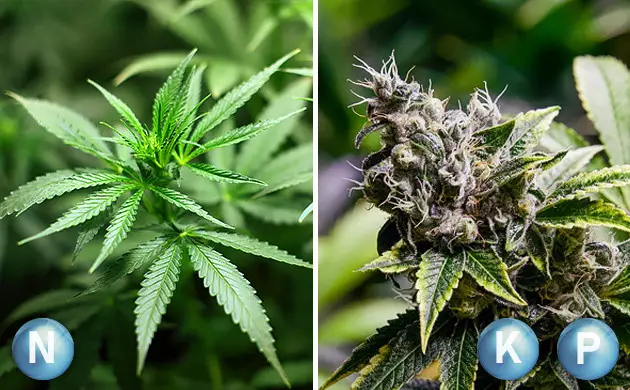
Since chemical nutrients are made using scientific processes, the concentration of minerals present in the mix will be fairly exact. As a result, growers have greater control over the nutrient dosage they’re delivering to their plants. This is extremely useful, because plants require different amounts of nutrients throughout their growth cycle. For example, during the veg phase, plants need more nitrogen. In contrast, they require more potassium and phosphorous in the flowering phase. Synthetic fertilizers let you dial in the exact nutrient intake for each stage of your plant’s development.
Mineral fertilizers are also instantly available for a plant to absorb. This is a significantly faster process than with organic nutrients, which plants need to work extra hard at to break down.
There are also some more practical reasons for choosing mineral fertilizers. For example, stores usually carry more mineral fertilizers than organic ones, so they’re easier to procure. They’re also significantly cheaper than organic fertilizers.
Cons Of Mineral Fertilizers
The benefits of synthetic nutrients don’t make them perfect, though. In fact, some of the pros of mineral nutrients end up being a double-edged sword. For example, the fact that they’re instantly available to your plants means your garden is at a higher risk of overfeeding. This can be particularly disastrous for newer growers, who often tend to overfeed their plants.
Synthetic nutrients also build up in your medium over time, leading to decreasing quality. As a result, more nutrients end up being wasted. In addition, nutrient buildup can change the pH of your medium, making it more difficult for the plants to absorb the minerals over time. However, regularly flushing your medium with pH’d water can help mitigate these problems.
What Are Organic Fertilizers For Cannabis?
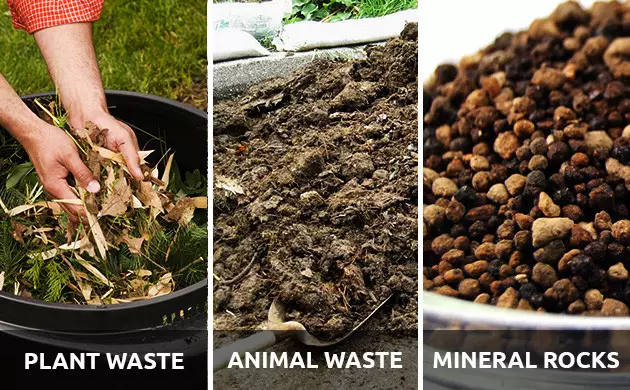
Like synthetic nutrients, the main components of organic fertilizers are nitrogen (N), potassium (K), and phosphorus (P). However, the way they’re produced and the forms they take are different than synthetic minerals. Organic nutrients are fertilizers derived from naturally-occurring sources. Generally, these sources include plant waste, animal waste, or mineral rocks.
Organic fertilizers are useful because they’re usually the best sources nature provides. Microorganisms like bacteria or certain beneficial fungi can be an important part of organic fertilizer mixes, because they help plants break fertilizers down into smaller, usable parts. This builds a healthy and balanced ecosystem in the soil that’s beneficial for your plant and helps it gradually receive all necessary elements.
Pros Of Organic Fertilizers
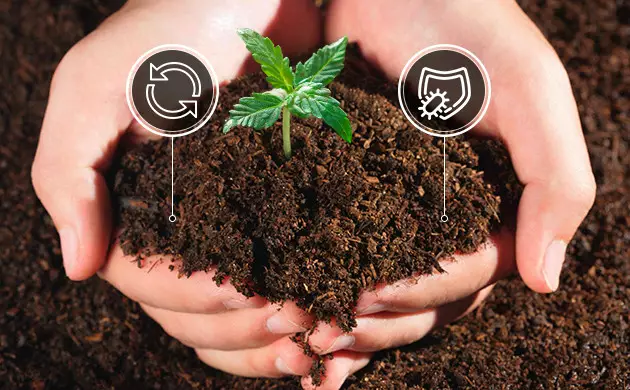
Organic fertilizers have several advantages. First, they’re significantly easier to use, especially for new growers. They have a lower chance of inducing nutrient overfeeding and don’t build up in your medium as readily as synthetic minerals do. Additionally, the same microorganisms in organic fertilizers that help break nutrients down give plants immune system boosts. That makes them generally more resilient to outbreaks and pathogens.
Another benefit of organic nutrients is their renewability. It’s significantly more environmentally friendly to use organic nutrients than synthetic ones. That’s because organic fertilizers generally come from natural sources like bat guano or bone meal.
Finally, many growers swear by organic fertilizers because they may improve the taste of the buds you harvest. Using synthetic fertilizers, in their opinion, can leave a salty, chemical-like taste in your buds after you dry and cure them. This distinction, though it’s haven’t been proved, is what divides many growers into two separate camps of pro-organic and pro-mineral growers.
Cons Of Organic Fertilizers
While organic fertilizers offer significantly more flexibility and ease of use than synthetic ones, they aren’t perfect. They have some limitations of their own, generally regarding how plants absorb organic nutrients.
There are several situations where a grower may find themselves pumping their plants with nutrients to no avail. First, organic nutrients are highly dependent on microorganisms to work correctly. Without the right microorganism balance in your soil, your plants may not be able to access the minerals present in their soil.
Additionally, organic nutrients take time to break down into parts your plants can use. As a result, it’s more difficult to fix nutrient imbalances with organic fertilizers – changing nutrients won’t have instantaneous effects. Cold temperatures can also slow down a plant’s metabolism with organic fertilizers, which isn’t as big of a problem with synthetic nutrients.
Best Nutrients On Amazon
Here, we’ll outline some of the best nutrients you can find on Amazon. We’ll include an analysis of these nutrients’ traits and benefits as well as their cost-effectiveness. We’ve included three of the most popular cannabis nutrient lines: Fox Farm, Advanced Nutrients, and General Hydroponics.
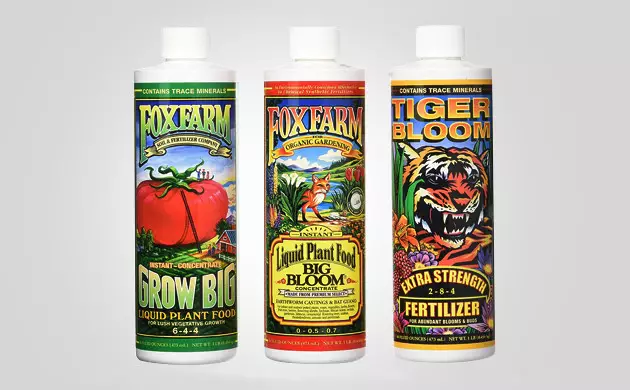
Fox Farm Liquid Nutrient Trio
Fox Farm is one of the best organic cannabis nutrients for both indoor and outdoor grows. This three-part nutrient mix, consisting of Fox Farm’s Grow Big, Big Bloom, and Tiger Bloom fertilizers, contains a slew of minerals derived from natural sources like bat guano and worm castings. Use Grow Big during the veg cycle and lean heavily on Big Bloom and Tiger Bloom once your plants reach the flowering phase. Coming in at just under $50 per three-pack, Fox Farm’s line of nutrients is also fairly priced.
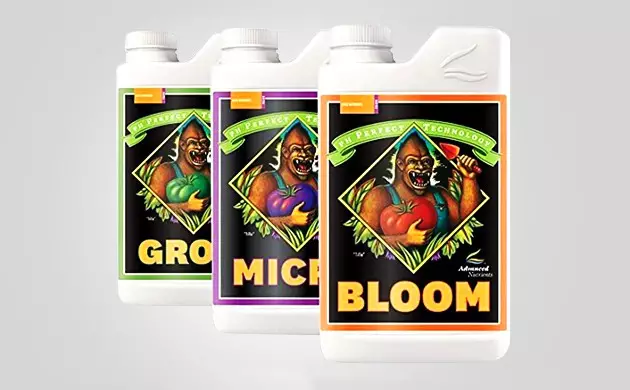
Advanced Nutrients 3-Pack
Advanced Nutrients is one of the biggest producers of synthetic nutrients in the cannabis industry. Their three-part nutrient line consists of Grow, primarily for the veg phase, and Bloom, best utilized during the flowering phase. The third component contains a slew of micronutrients like iron, boron, and molybdenum to ensure your plants have all the minerals they need to thrive. Each three-bottle pack clocks in at about $40, just a bit cheaper than the organic nutrients Fox Farm produces.
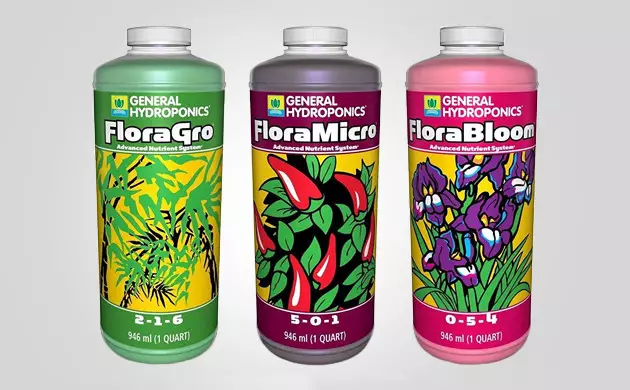
General Hydroponics Flora Series
Owned by the same company that produces Miracle-Gro, General Hydroponics is the industry standard of professional cannabis growers. These synthetic nutrients are some of the simplest and best hydroponic nutrients on the market today.
Outside of cannabis, General Hydroponics is used across a wide array of gardens. It’s even a top choice for astronauts growing flowers and veggies in space, as well as for Antarctic research teams. It’s similar in price to Advanced Nutrients at about $40 per three-bottle pack.
Growing With Super Soil – True Organic Growing
While naturally-derived nutrients are a great way to incorporate real-world elements into your garden, they alone don’t make for a truly organic grow. That’s where super soil comes in.
Super soil (sometimes called “supersoil”) is a type of compost made from natural ingredients. It’s considered a type of “living soil” because it’s home to countless forms of microbial life. These fungi and bacteria work in synergy with the natural nutrients in the soil and the roots of your plant. Super soil is widely considered the best growing technique for showcasing the natural flavors of any strain.
Making Super Soil
We outlined a super soil recipe in our complete guide to super soil, but we’ll sum it up here.
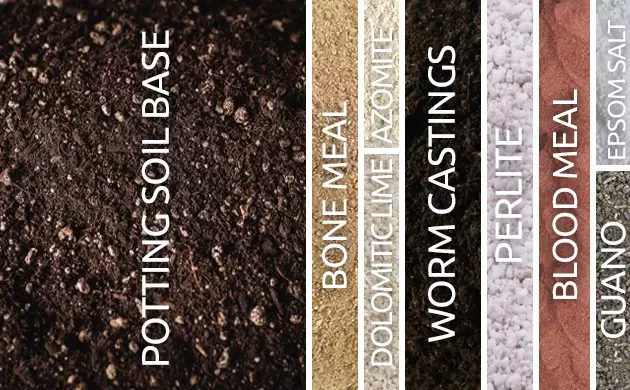
- Empty 10 gallons (37 kilos) of potting soil base into the mixing container.
- Add 1.6 pounds (0.7 kilos) of bone meal and 3.25 more gallons (12.5 liters) of soil. Mix.
- Add ¼ cup (65 milliliters) of dolomitic lime, 1/8 cup (30 milliliters) of azomite, and 3.25 more gallons (12.5 liters) of soil. Mix.
- Add 7.5 pounds (3.4 kilos) of worm castings and another 10 gallons (37 liters) of soil. Mix.
- Add perlite, 7.5 more pounds (3.4 kilos) of worm castings, and 2.5 gallons (9 liters) of soil. Rake lightly to mix.
- Finally, add 1.25 pounds (0.5 kilos) of blood meal, 1 pound (0.45 kilos) of bat guano, and 1/4 cup (65 milliliters) of Epsom salt. Mix well.
Super Soil Pros
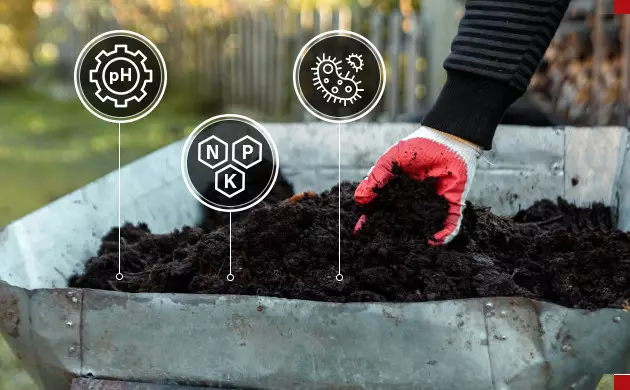
Super soil has several benefits. First, the soil itself contains all the nutrients your plants need to thrive. As a result, you won’t need to worry about making your own nutrient mixes. Instead, you can just feed water.
Super soil also self-regulates pH. Because of this handy fact, a grower won’t even need to worry about changing the pH of their water. These two traits make feeding your plants – normally an involved and time-consuming process – a breeze. This also has another unintended benefit. Because you aren’t feeding your plants nutrient salts, you won’t need to worry about flushing them before harvest. Super soil has a reputation for creating some of the best-tasting weed out there.
Finally, the microbial life teeming in super soil helps to inoculate your plants against pests. Beneficial microbes can out-compete other, less friendly kinds that can become vectors for disease.
Super Soil Cons
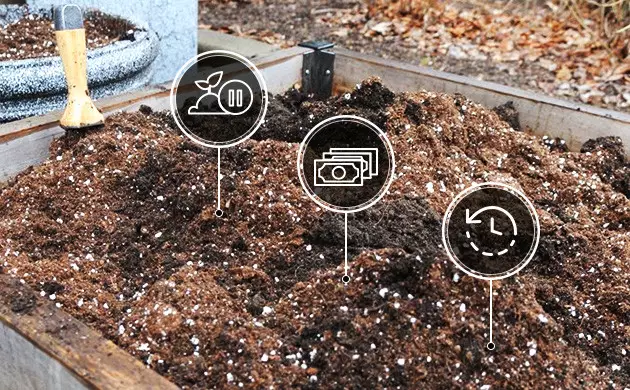
Despite all the benefits of super soil, it has two major setbacks. First, it’s expensive. The ingredients in super soil generally cost significantly more than pre-made nutrient lines, even organic ones. Second, making super soil takes a lot of work. You’ll need to wait between 30 and 60 days for your compost to be ready, so you need to plan ahead. This also means that super soil is generally better-suited for small-scale grows, since they require fewer media.
Another setback to super soil is that it reduces plant growth and extends the flowering time. You won’t be able to pull down the same yield from a super soil garden as you would from a hydroponic grow. In addition, your plants will grow more slowly. This is generally most pronounced during the vegetative phase. All in all, using super soil may extend your overall grow cycle by up to 3 weeks.
The Verdict: Mineral Fertilizers Vs. Organic Fertilizers Vs. Super Soil
The debate between the merits of super soil, synthetic, and organic fertilizers has raged for years. Ultimately, there’s no “right” way to do things. Each of these techniques has its own benefits.
Mineral fertilizers are great for experienced growers who want to produce weight. Synthetic nutrients may not create the best-tasting weed in the world, but will help your plants grow fast and generate big yields. Mineral fertilizers are also a good choice for large-scale grows, because they can produce fairly standardized results in large numbers of plants. Finally, synthetic nutrients are best-suited for hydroponic gardens.
Organic nutrients and super soil share some similarities with the benefits they provide. They both involve using natural methods to get nutrients to your root zone. They also create great-tasting weed, but the overall yield of a garden may suffer. Finally, they’re generally more expensive than mineral fertilizers.
The right type of fertilizer for your grow will depend on these kinds of factors. You’ll need to analyze your variables and decide which you prefer. You may even want to try mixing organic and synthetic nutrients, although this is something you need to approach very tactically and carefully. Ultimately, with experience, you’ll develop a mix that’s perfect for your garden.
Herbies Head Shop expressly refuses to support the use, production, or supply of illegal substances. For more details read our Legal Disclaimer.
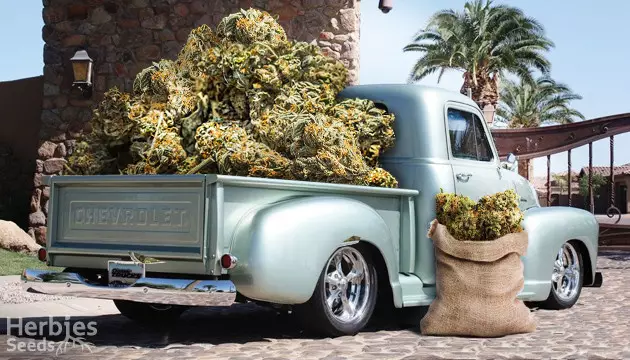



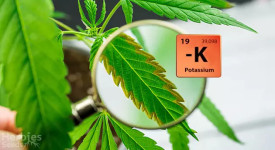


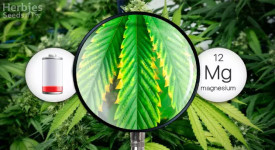

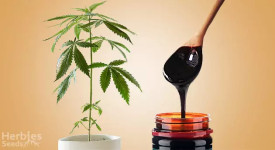

Thank you for leaving a comment for us!
Your feedback will be posted shortly after our moderator checks it.
Please note that we don’t publish reviews that: